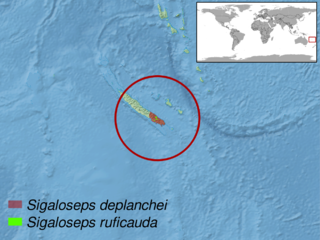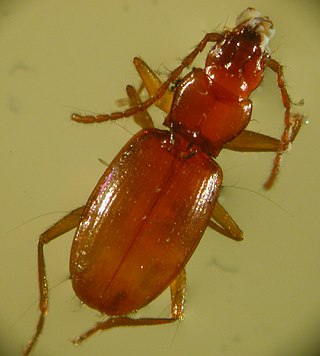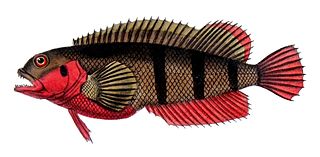
Skinks are lizards belonging to the family Scincidae, a family in the infraorder Scincomorpha. With more than 1,500 described species across 100 different taxonomic genera, the family Scincidae is one of the most diverse families of lizards. Skinks are characterized by their smaller legs in comparison to typical lizards and are found in different habitats except arctic and subarctic regions.

Sigaloseps is a genus of skinks which inhabit the moist, closed forest of southern New Caledonia.

Cryptobatrachus is a genus of frogs in the family Hemiphractidae. They are found in Colombia and Venezuela. They are also known as backpack frogs, as the females have the habit of carrying their egg clutch on their backs until the young hatch; this behavior also occurs in the related hemiphractid genera Hemiphractus and Stefania.

Anders Piltz is a Swedish Latinist, medievalist, Dominican friar, and Roman Catholic priest

The grey-winged cotinga is a species of bird in the family Cotingidae. It is endemic to Brazil where it is restricted to the Serra dos Órgãos and Serra do Tinguá in Rio de Janeiro State. Its natural habitat is tropical moist montane forest.

Harpalus is a genus of ground beetle first described by Pierre André Latreille in 1802.
"Pange lingua gloriosi proelium certaminis" is a 6th-century AD Latin hymn generally credited to the Christian poet St. Venantius Fortunatus, Bishop of Poitiers, celebrating the Passion of Christ. In the Catholic Church, the first five stanzas are used at Matins during Passiontide in the Divine Office, with the remaining stanzas sung at Lauds. Both parts are chanted during the Adoration of the Cross on Good Friday.

Pseudanophthalmus is a genus of cave beetle. Over 200 species have been described in the caves of ten states of the eastern United States.

Coccophagus is a large genus of chalcid wasps belonging to the family Aphelinidae.

Labrisomus is a genus of labrisomid blennies native to the western Atlantic ocean and the eastern Pacific Ocean.

Labrisomus conditus, the Masquerader hairy blenny, is a species of labrisomid blenny native to the Fernando de Noronha Archipelago, off northeastern Brazil, and it has been reported from Florida, United States, in the Atlantic Ocean. This species can reach a length of 13.4 centimetres (5.3 in) SL.
Masquerader, Masqueraders, The Masquerader or The Masqueraders may refer to:
The Catalogus Baronum is a collection of registers of the military obligations owed by the barons of the Kingdom of Sicily. The collection was compiled in 1322 under the Angevin dynasty. It contains three distinct registers from different periods and covering different regions of the kingdom. The first, the Quaternus magne expeditionis, was originally compiled under the Norman king Roger II in 1150–51, then revised by his grandson, William II in 1167–68. It listed the fiefs of the crown in the Principality of Capua, the Duchy of Apulia, and the Abruzzi and detailed the services each owed. The second register was composed under William around 1175. It lists only the knights of Aquino, Arce, and Sora. The third register, the Pheudatarii iusticiaratus Capitanatae, is that of the Swabian king Frederick II from 1239–40. It lists only the feudatories of the Capitanate.

Eugongylinae is a subfamily of skinks within the family Scincidae. The genera in this subfamily were previously found to belong the Eugongylus group in the large subfamily Lygosominae.
Sigaloseps balios is a species of skink found in New Caledonia.

Sigaloseps deplanchei, Deplanche's shiny skink, is a species of lizard in the family Scincidae. The species is endemic to New Caledonia.
Sigaloseps ferrugicauda is a species of skink found in New Caledonia.
Sigaloseps pisinnus is a species of skink found in New Caledonia.

Sigaloseps ruficauda is a species of skink found in New Caledonia.
Phoeniconaias proeses is an extinct species of flamingo from the Pliocene of Australia. Fossil material was described under several names including Ocyplanus proeses and Phoeniconaias gracilis, which were eventually found to be synonymous. Only material from the Tirari Formation has been dated, while most other material lacks precise information on its age. P. proeses was one of the smallest species of flamingo, smaller than the modern lesser flamingo which it may be related to.












